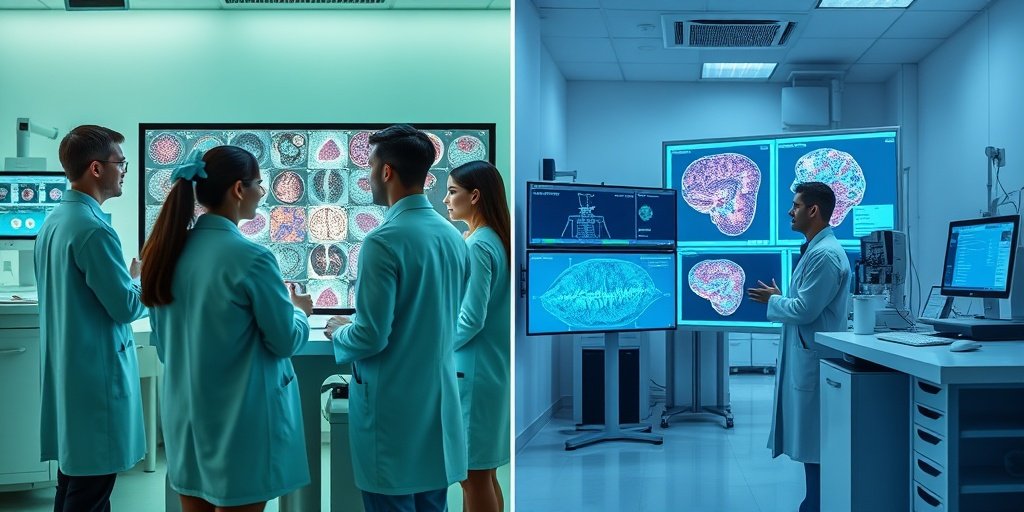⚡ Quick Summary
The article “Reshaping Pathology Culture” emphasizes the need for a cultural transformation in pathology departments to adapt to modern healthcare demands. It advocates for a shift towards collaborative leadership and the integration of advanced technologies like artificial intelligence and digital pathology to enhance diagnostic accuracy and efficiency.
🔍 Key Details
- 📊 Focus: Transformation of organizational culture in pathology
- 👥 Leadership Model: Shift from hierarchical to collaborative leadership
- ⚙️ Technologies: Emphasis on artificial intelligence and digital pathology
- 📚 Education: Importance of continuous education and adaptability
- 🌈 Diversity: Fostering diversity and inclusion as a cultural cornerstone
🔑 Key Takeaways
- 🔄 Cultural Shift is essential for pathology departments to thrive in modern healthcare.
- 🤝 Collaborative Leadership unites pathologists and technologists across generations.
- 💻 Advanced Technologies like AI and digital pathology are crucial for improving diagnostic processes.
- 📖 Continuous Education is vital for adapting to the evolving clinical and regulatory landscape.
- 🌍 Diversity and Inclusion enhance team dynamics and support professional growth.
- 🚀 Future Readiness requires a proactive approach to cultural evolution in pathology.

📚 Background
The field of pathology is undergoing significant changes driven by advancements in technology and evolving healthcare needs. Traditional hierarchical structures often hinder collaboration and innovation. As healthcare becomes more complex, there is a pressing need for pathology departments to embrace a culture that fosters teamwork, adaptability, and inclusivity.
🗒️ Study
The article, authored by Elzie D and published in Clin Lab Med, discusses the necessary cultural transformations within pathology departments. It highlights the importance of moving away from outdated hierarchical models towards a more collaborative approach that integrates diverse perspectives and expertise.
📈 Results
The article underscores that embracing advanced technologies such as artificial intelligence and digital pathology is not just about the tools themselves but also about the cultural evolution required to utilize these technologies effectively. This cultural shift is essential for optimizing diagnostic accuracy and improving overall efficiency in pathology practices.
🌍 Impact and Implications
The implications of reshaping organizational culture in pathology are profound. By fostering a culture of collaboration and inclusivity, pathology departments can enhance their diagnostic capabilities and better meet the needs of modern healthcare. This transformation not only benefits the professionals within the field but also leads to improved patient outcomes and satisfaction.
🔮 Conclusion
The article “Reshaping Pathology Culture” presents a compelling case for the need to evolve the organizational culture within pathology departments. By embracing collaborative leadership and advanced technologies, the field can significantly enhance its effectiveness and adaptability. The future of pathology lies in its ability to foster a culture that values diversity, continuous education, and innovation.
💬 Your comments
What are your thoughts on the cultural transformation needed in pathology? We would love to hear your insights! 💬 Share your comments below or connect with us on social media:
Reshaping Organizational Culture in Pathology.
Abstract
“Reshaping Pathology Culture” explores the transformation needed in pathology departments to meet the demands of modern health care. It advocates a shift from traditional hierarchical models to collaborative leadership, uniting cross-generational pathologists and technologists. Embracing advanced technologies like artificial intelligence and digital pathology requires a parallel cultural evolution to optimize diagnostic accuracy and efficiency. The article highlights the importance of continuous education and adaptability for thriving in a dynamic clinical and regulatory landscape. Additionally, fostering diversity and inclusion is emphasized as a cornerstone for creating a culture that values diverse perspectives and supports professional growth for all team members.
Author: [‘Elzie D’]
Journal: Clin Lab Med
Citation: Elzie D. Reshaping Organizational Culture in Pathology. Reshaping Organizational Culture in Pathology. 2025; 45:383-396. doi: 10.1016/j.cll.2025.04.002